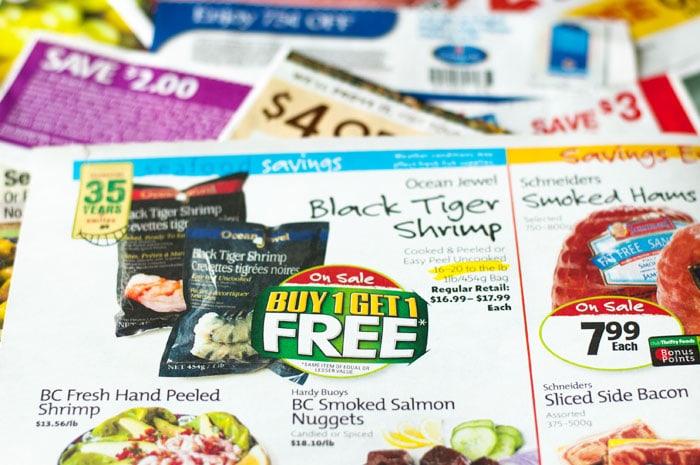Do you dread going to the checkout counter when you grocery shop, fearing the total bill you’ll see once all your items are rung through? It can sometimes be a staggering amount. If you’re trying to shop on a budget, it can be tempting to choose low-quality processed foods because they appear to bring down your total grocery bill. But the truth is that you can save money on groceries and still come home with healthy ingredients for nutritious meals in your cart. Here are our top five strategies for saving money at the grocery store.

Top 5 Tips to Cut Your Grocery Bill
- Check local flyers: Take 15 minutes to check the grocery store flyers that are delivered to your mailbox. If you feel like you don’t have time, try making this a project you tackle during the commercials of your favorite TV show. If you regularly shop at a few different stores, check to see which store has the best deals on the items you need or regularly use. Some grocery stores price-match competitors. If you only have one store close by, check for items that store well and are worth stocking up on – like chicken breasts that can be frozen or whole grain cereals with best-before dates well in the future.
- Skip prepared frozen products: These packaged items may seem like time-savers, but you can often make the same product yourself in the time it takes your oven to pre-heat, and you’ll often save a fair bit of money in the process. (Bonus: You’ll skip the food additives and high sodium levels, too.) For example, in our No More Packaged Foods series, we provide quick and simple recipes for hamburger patties (48% savings over frozen), chicken wings (32% savings over frozen), and pizza (63% savings over frozen) that will trim your grocery budget while allowing your family to enjoy the foods they love.
- Check the bulk section (especially grains): For dry goods like flour and grains, or baking products like raisins and chocolate chips, it’s hard to beat the value found in your grocery store’s bulk section. The bonus is you can buy only the amount you need, rather than having to buy huge packages to take advantage of bulk pricing. Invest in some good storage canisters or well-sealed containers to store your bulk purchases once you get them home.
- Clip coupons: For some people, coupons are a near obsession – and scoring a good one can create real excitement. For most, though, coupon clipping is not exactly counted as a fun hobby. Again, to get this money-saving chore done without losing more time from your day, make it a commercial-break task. Clip coupons for all the products you use, even if you don’t need them that week. Buy a small organizer with different sections to store coupons by food category or area of the supermarket so you can check for savings before each shop. But be careful with this tip: Many coupons are for packaged foods. Don’t be tempted to buy them just because there’s a coupon available. Only clip coupons for healthy foods your family regularly eats.
- Look for discounts on items that are about to expire: The savings here can be dramatic – I recently purchased a loaf of whole grain bread that was expiring a day later for 28 cents. I put it in the freezer and used it for toast for the rest of the week. When using this trick, time is of the essence. Use the products the day you buy them or get them into your freezer right away.
Of course, one extra way to save money on your groceries is simply to make sure you actually use everything you buy. Thirty percent of food worldwide ends up in the garbage. If you can reduce the amount of food you throw away, you can reduce the amount of food you need to buy.
The Bottom Line
Buying good-quality food is an investment in your family’s health. Implementing these simple money-saving strategies can make each trip to the grocery store a little less painful, or free up more of your budget for organic items and higher-quality ingredients.
Alumni: University of Victoria – Christina Newberry is a writer and editor whose work has appeared in national and local magazines and newspapers. With a Bachelor’s degree in English and Anthropology from the University of Victoria and a Journalism Certificate from Langara College, Christina brings keen curiosity and the love of a good story to her work with HealthCastle.com.
Christina is a passionate traveler and urban gardener with an interest in vegetarian eating and making good, tasty food from scratch. Sharing lessons learned from her own experiences, Christina writes about lifestyle topics for HealthCastle, with a focus on eating well at home and on the road.


